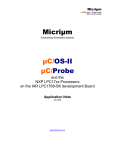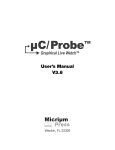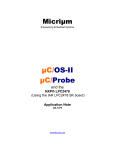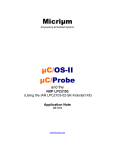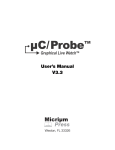Download µC/CPU User`s Manual
Transcript
μC/ CPU
CPU-Specific Ports
User’s Manual
V1.28.01
TM
Micriμm
1290 Weston Road, Suite 306
Weston, FL 33326
USA
www.Micrium.com
Designations used by companies to distinguish their products are often claimed as
trademarks. In all instances where Micriμm Press is aware of a trademark claim, the product
name appears in initial capital letters, in all capital letters, or in accordance with the
vendor’s capatilization preference. Readers should contact the appropriate companies for
more complete information on trademarks and trademark registrations. All trademarks and
registerd trademarks in this book are the property of their respective holders.
Copyright © 2010 by Micriμm except where noted otherwise. All rights reserved. Printed in
the United States of America. No part of this publication may be reproduced or distributed
in any form or by any means, or stored in a database or retrieval system, without the prior
written permission of the publisher; with the exception that the program listings may be
entered, stored, and executed in a computer system, but they may not be reproduced for
publication.
The programs and code examples in this book are presented for instructional value. The
programs and examples have been carefully tested, but are not guaranteed to any particular
purpose. The publisher does not offer any warranties and does not guarantee the accuracy,
adequacy, or completeness of any information herein and is not responsible for any errors
and ommissions. The publisher assumes no liability for damages resulting from the use of
the information in this book or for any infringement of the intellectual property rights of
third parties that would result from the use of this information.
600-uC-CPU-003
USER’S MANUAL VERSIONS
If you find any errors in this document, please inform us and we will make the appropriate
corrections for future releases.
Manual Version
Date
By
Description
V1.23
2009/06/22
SR
Created Manual
V1.23
2009/07/05
ITJ
Updated Manual
V1.23
2009/07/13
ITJ
Released Manual V1.23
V1.24
2009/08/24
ITJ
Added CPU Timestamp Notes/Examples
V1.24
2009/12/07
ITJ
Added CPU Timestamp Frequency
V1.25
2010/01/10
ITJ
Updated CPU Timestamp Changes
V1.26
2010/04/19
ITJ
Updated Manual
V1.27
2010/06/18
ITJ
Updated Manual
V1.27a
2010/09/20
ITJ
Converted document from Word to FrameMaker
V1.28
2010/12/17
ITJ
Updated Manual
V1.28.00
2011/02/16
ITJ
Re-released V1.28 Manual as V1.28.00
3
Table of Contents
0-1
User’s Manual Versions ......................................................................... 3
Chapter 1
1-1
1-2
1-3
1-4
1-5
1-6
Introduction ............................................................................................ 6
Portable .................................................................................................. 6
Scalable .................................................................................................. 6
Coding Standards .................................................................................. 6
MISRA C ................................................................................................. 7
Safety Critical Certification .................................................................... 7
μC/CPU Limitations ............................................................................... 7
Chapter 2
Directories and Files .............................................................................. 8
Chapter 3
3-1
3-2
3-2-1
3-2-2
3-3
3-4
3-4-1
3-4-2
3-4-3
3-4-4
3-4-5
μC/CPU Processor/Compiler Port Files .............................................. 11
Standard Data Types ........................................................................... 11
CPU Words ........................................................................................... 11
CPU Word Sizes ................................................................................... 11
CPU Word-Memory Order ................................................................... 12
CPU Stacks .......................................................................................... 12
CPU Critical Sections .......................................................................... 12
CPU_SR_ALLOC() ................................................................................ 13
CPU_CRITICAL_ENTER() ..................................................................... 14
CPU_CRITICAL_EXIT() ......................................................................... 16
CPU_INT_DIS() ..................................................................................... 17
CPU_INT_EN() ...................................................................................... 18
4
Chapter 4
4-1
4-2
4-2-1
4-2-2
4-2-3
μC/CPU Core Library ........................................................................... 20
μC/CPU Core Library Configuration .................................................... 20
μC/CPU Core Library Functions and Macros ..................................... 20
CPU_Init() .............................................................................................. 20
CPU_SW_EXCEPTION() ....................................................................... 21
CPU_CntLeadZeros() ........................................................................... 23
Chapter 5
5-1
5-2
5-2-1
5-2-2
5-2-3
μC/CPU Host Name ............................................................................. 25
μC/CPU Host Name Configuration ...................................................... 25
μC/CPU Host Name Functions ............................................................ 26
CPU_NameClr() .................................................................................... 26
CPU_NameGet() ................................................................................... 26
CPU_NameSet() .................................................................................... 28
Chapter 6
6-1
6-2
6-2-1
6-2-2
6-2-3
6-2-4
6-2-5
6-2-6
6-2-7
6-2-8
6-2-9
μC/CPU Timestamps ........................................................................... 30
μC/CPU Timestamps Configuration .................................................... 31
μC/CPU Timestamps Functions .......................................................... 31
CPU_TS_Get32() ................................................................................... 31
CPU_TS_Get64() ................................................................................... 32
CPU_TS_Update() ................................................................................ 34
CPU_TS_TmrInit() ................................................................................. 35
CPU_TS_TmrRd() ................................................................................. 37
CPU_TS_TmrFreqGet() ........................................................................ 40
CPU_TS_TmrFreqSet() ......................................................................... 41
CPU_TS32_to_uSec() ........................................................................... 42
CPU_TS64_to_uSec() ........................................................................... 44
Chapter 7
7-1
7-2
7-2-1
7-2-2
7-2-3
μC/CPU Interrupts Disabled Time Measurement ............................... 46
μC/CPU Interrupts Disabled Time Measurement Configuration ....... 46
μC/CPU Interrupts Disabled Time Measurement Functions .............. 47
CPU_IntDisMeasMaxGet() ................................................................... 47
CPU_IntDisMeasMaxCurGet() ............................................................. 48
CPU_IntDisMeasMaxCurReset() ......................................................... 49
Appendix A
μC/CPU Licensing Policy ..................................................................... 50
5
Chapter
1
Introduction
Designed with Micriμm’s renowned quality, scalability and reliability, the purpose of
μC/CPU is to provide a clean, organized ANSI C implementation of each processor’s/
compiler’s hardware-dependent.
1-1 PORTABLE
μC/CPU was designed for the vast variety of embedded applications. The
processor-dependent source code for μC/CPU is designed to be ported to any processor
(CPU) and compiler while μC/CPU’s core library source code is designed to be independent
of and used with any processor/compiler.
1-2 SCALABLE
The memory footprint of μC/CPU can be adjusted at compile time based on the features
you need and the desired level of run-time performance.
1-3 CODING STANDARDS
Coding standards have been established early in the design of μC/CPU and include:
■
C coding style
■
Naming convention for #define constants, macros, variables and functions
■
Commenting
■
Directory structure
6
1
Introduction
1-4 MISRA C
The source code for μC/CPU follows the Motor Industry Software Reliability Association
(MISRA) C Coding Standards. These standards were created by MISRA to improve the
reliability and predictability of C programs in critical automotive systems. Members of the
MISRA consortium include Delco Electronics, Ford Motor Company, Jaguar Cars Ltd., Lotus
Engineering, Lucas Electronics, Rolls-Royce, Rover Group Ltd., and other firms and
universities dedicated to improving safety and reliability in automotive electronics. Full
details of this standard can be obtained directly from the MISRA web site,
http://www.misra.org.uk.
1-5 SAFETY CRITICAL CERTIFICATION
μC/CPU has been designed and implemented with safety critical certification in mind.
μC/CPU is intended for use in any high-reliability, safety-critical systems including avionics
RTCA DO-178B and EUROCAE ED-12B, medical FDA 510(k), IEC 61508 industrial control
systems, and EN-50128 rail transportation and nuclear systems.
For example, the FAA (Federal Aviation Administration) requires that all the source code for
an application be available in source form and conforming to specific software standards in
order to be certified for avionics systems. Since most standard library functions are provided
by compiler vendors in uncertifiable binary format, μC/CPU provides its library functions in
certifiable source-code format.
If your product is not safety critical, you should view the software and safety-critical
standards as proof that μC/CPU is a very robust and highly-reliable software module.
1-6 μC/CPU LIMITATIONS
By design, we have limited some of the feature of μC/CPU:
■
Support for 64-bit data not available for all CPUs
7
Chapter
2
Directories and Files
The distribution of μC/CPU is typically included in a ZIP file called:
Micrium_uC-CPU-Vxyy.zip . (Note: The ZIP file name might also include customer names,
invoice numbers, and file creation date.) The ZIP file contains all the source code and
documentation for μC/CPU organized in a directory structure according to “AN-2002,
μC/OS-II Directory Structure.” Specifically, the files may be found in the following
directories:
\Micrium\Software\uC-CPU
This is the main directory for μC/CPU and contains generic, processor-independent source
code including:
cpu_def.h
This file declares #define constants used to configure processor/compiler-specific CPU
word sizes, endianness word order, critical section methods, and other processor
configuration.
cpu_core.c and cpu_core.h
These files contain source code that implements μC/CPU features such as host name
allocation, timestamps, time measurements, and counting lead zeros.
\Micrium\Software\uC-CPU\Doc
This directory contains all μC/CPU documentation files.
\Micrium\Software\uC-CPU\Cfg\Template
This directory contains a template file, cpu_cfg.h, which includes configuration for
μC/CPU features such as host name allocation, timestamps, time measurements, and
assembly optimization. Your application must include a cpu_cfg.h configuration file with
application-specific configuration settings.
8
Directories and Files
\Micrium\Software\uC-CPU\BSP\Template
This directory contains a template file, cpu_bsp.c, which includes function templates for
the board-specific (BSP) code required if certain μC/CPU features such as timestamp time
measurements and assembly optimization are enabled. Your application must include code
for all BSP functions enabled in cpu_cfg.h.
\Micrium\Software\<CPU Type>\<Compiler>
μC/CPU also contains additional sub-directories specific to each processor/compiler
combination organized as follows:
cpu.h
This file contains μC/CPU configuration specific to the processor (CPU Type) and compiler
(Compiler), such as data type definitions, processor address and data word sizes,
endianness word order, and critical section macros. See Chapter 3, “μC/CPU
Processor/Compiler Port Files” on page 11 for more details.
cpu_a.asm or cpu_a.s
These (optional) files contains assembly code to enable/disable interrupts, implement
critical section methods, and any other processor-specific code not already defined or
implemented in the processor’s cpu.h (or cpu.c).
cpu.c
This (optional) file contains C and/or assembly code to implement processor-specific code
not already defined or implemented in the processor’s cpu.h (or cpu_a.asm).
\Template\cpu.h and cpu_a.asm
These template μC/CPU configuration files include example configurations for a generic
processor/compiler.
9
Directories and Files
An example of ARM-specific CPU processor files is shown in Figure 2-1:
Figure 2-1 μC/CPU ARM CPU Directories and Files Example
Application files which intend to make use of μC/CPU macros or functions should
#include the desired μC/CPU header files. In addition, applications are required to
configure μC/CPU features in application-specific configuration file, cpu_cfg.h .
10
Chapter
3
μC/CPU Processor/Compiler Port Files
μC/CPU contains configuration specific to each processor and compiler, such as standard
data type definitions, processor address and data word sizes, endianness word order, critical
section macros, and possibly other functions and macros. These are defined in each specific
processor/compiler subdirectory’s cpu.h.
3-1 STANDARD DATA TYPES
μC/CPU ports define standard data types such as CPU_CHAR, CPU_BOOLEAN, CPU_INT08U,
CPU_INT16S, CPU_FP32, etc. These data types are used in Micriμm applications, and may be
used in your applications, to facilitate portability independent of and between
processors/compilers. Most μC/CPU processor/compiler port files minimally support 32-bit
data types, but may optionally support 64-bit (or greater) data types.
In addition, several regularly-used function pointer data types are defined.
3-2 CPU WORDS
3-2-1 CPU WORD SIZES
μC/CPU ports include word size configuration such as CPU_CFG_ADDR_SIZE and
CPU_CFG_DATA_SIZE, configured via CPU_WORD_SIZE_08, CPU_WORD_SIZE_16, and
CPU_WORD_SIZE_32.
In addition, the following CPU word sizes are also defined based on the configured sizes of
CPU_CFG_ADDR_SIZE and CPU_CFG_DATA_SIZE : CPU_ADDR, CPU_DATA, CPU_ALIGN, and
CPU_SIZE_T.
11
μC/CPU Processor/Compiler Port Files
3-2-2 CPU WORD-MEMORY ORDER
μC/CPU ports configure CPU_CFG_ENDIAN_TYPE to indicate the processor’s word-memory
order endianness. CPU_ENDIAN_TYPE_LITTLE indicates that a CPU stores/reads data words
in memory with the most significant octets at lower memory addresses (and the least
significant octets at higher memory addresses) while a CPU_ENDIAN_TYPE_BIG CPU
stores/reads data words in memory with the most significant octets at higher memory
addresses (and the least significant octets at lower memory addresses).
3-3 CPU STACKS
μC/CPU ports configure CPU_CFG_STK_GROWTH to indicate the direction in memory a CPU
updates its stack pointers after pushing data onto its stacks. CPU_STK_GROWTH_HI_TO_LO
indicates that a CPU decrements its stack pointers to the next lower memory address after
data is pushed onto a CPU stack while a CPU_STK_GROWTH_LO_TO_HI CPU increments its
stack pointers to the next higher memory address after data is pushed.
In addition, each μC/CPU processor port defines a CPU_STK data type to the CPU’s stack
word size.
3-4 CPU CRITICAL SECTIONS
μC/CPU ports include CPU critical section configuration CPU_CFG_CRITICAL_METHOD that
indicates how a CPU disables/re-enables interrupts when entering/exiting critical, protected
sections:
CPU_CRITICAL_METHOD_INT_DIS_EN merely disables/enables interrupts on critical section
enter/exit. This is not a preferred method since it does not support multiple levels of
interrupts. However, with some processors/compilers, this is the only available method.
CPU_CRITICAL_METHOD_STATUS_STK pushes/pops interrupt status onto stack before
disabling/re-enabling interrupts. This is one preferred method since it supports multiple
levels of interrupts. However, this method assumes that the compiler provides C-level
and/or assembly-level functionality for pushing/saving the interrupt status onto a local
stack, disabling interrupts, and popping/restoring the interrupt status from the local stack.
CPU_CRITICAL_METHOD_STATUS_LOCAL saves/restores interrupt status to a local variable
before disabling/re-enabling interrupts. This also is a preferred method since it supports
12
μC/CPU Processor/Compiler Port Files
multiple levels of interrupts. However, this method assumes that the compiler provides
C-level and/or assembly-level functionality for saving the interrupt status to a local
variable, disabling interrupts, and restoring the interrupt status from the local variable.
Each μC/CPU processor port implements critical section macros with calls to interrupt
disable/enable macros. Applications should only use the critical section macros (see section
3-4-2 “CPU_CRITICAL_ENTER()” on page 14 and section 3-4-3 “CPU_CRITICAL_EXIT()” on
page 16) since interrupt disable/enable macros (see section 3-4-4 “CPU_INT_DIS()” on
page 17 and section 3-4-5 “CPU_INT_EN()” on page 18) are intended for use only by core
μC/CPU functions.
Each μC/CPU processor port may define its interrupt disable/enable macros with
inline-assembly directly in cpu.h, or calls to C functions defined in cpu.c, or calls to
assembly subroutines defined in cpu_a.asm (or cpu_a.s). The specific implementation
should be based on the processor port’s configured CPU critical section method.
In addition, each μC/CPU processor port defines an appropriately-sized CPU_SR data type
large enough to completely store the processor’s/compiler’s status word.
CPU_CRITICAL_METHOD_STATUS_LOCAL method requires each function that calls critical
section macros or interrupt disable/enable macros to declare local variable cpu_sr of type
CPU_SR, which should be declared via the CPU_SR_ALLOC() macro (see section 3-4-1).
3-4-1 CPU_SR_ALLOC()
Allocates CPU status register word as local variable cpu_sr, when necessary, for use with
critical section macros.
FILES
Each specific processor’s/compiler’s cpu.h
PROTOTYPE
CPU_SR_ALLOC();
13
μC/CPU Processor/Compiler Port Files
ARGUMENTS
None.
RETURNED VALUE
None.
REQUIRED CONFIGURATION
None.
NOTES / WARNINGS
CPU_SR_ALLOC() must be called immediately after the last local variable declaration in a
function but before any code statements.
EXAMPLE USAGE
CPU_BOOLEAN ts_init;
CPU_TS
ts_cur;
CPU_SR_ALLOC();
/* Declared immediately after all local variables ... */
/* ... but before any code statements.
*/
ts_init = DEF_YES;
ts_cur = CPU_TS_TmrRd();
3-4-2 CPU_CRITICAL_ENTER()
Enters critical sections, disabling interrupts.
FILES
Each specific processor’s/compiler’s cpu.h
PROTOTYPE
CPU_CRITICAL_ENTER();
14
μC/CPU Processor/Compiler Port Files
ARGUMENTS
None.
RETURNED VALUE
None.
REQUIRED CONFIGURATION
None.
NOTES / WARNINGS
CPU_CRITICAL_ENTER()/CPU_CRITICAL_EXIT() should be used to protect critical sections
of code from interrupted or concurrent access when no other protection mechanisms are
available or appropriate. For example, system code that must be re-entrant but without use
of a software lock should protect the code using CPU critical sections.
Since interrupts are disabled upon calling CPU_CRITICAL_ENTER() and are not re-enabled
until after calling CPU_CRITICAL_EXIT(), interrupt and operating system context switching
are postponed while all critical sections have not completely exited.
Critical sections can be nested any number of times as long as CPU_CFG_CRITICAL_METHOD
is not configured as CPU_CRITICAL_METHOD_INT_DIS_EN, which would re-enable interrupts
upon the first call to CPU_CRITICAL_EXIT(), not the last call.
CPU_CRITICAL_ENTER() should/must always call CPU_CRITICAL_EXIT() once critical
section protection is no longer needed.
EXAMPLE USAGE
CPU_SR_ALLOC();
CPU_CRITICAL_ENTER();
:
:
/* Code protected by critical sections ... */
:
/* ... from interrupts or concurrent access. */
:
CPU_CRITICAL_EXIT();
15
μC/CPU Processor/Compiler Port Files
3-4-3 CPU_CRITICAL_EXIT()
Exits critical sections, restoring previous interrupt status and/or enabling interrupts.
FILES
Each specific processor’s/compiler’s cpu.h
PROTOTYPE
CPU_CRITICAL_EXIT();
ARGUMENTS
None.
RETURNED VALUE
None.
REQUIRED CONFIGURATION
None.
NOTES / WARNINGS
CPU_CRITICAL_ENTER()/CPU_CRITICAL_EXIT() should be used to protect critical sections
of code from interrupted or concurrent access when no other protection mechanisms are
available or appropriate. For example, system code that must be re-entrant but without use
of a software lock should protect the code using CPU critical sections.
Since interrupts are disabled upon calling CPU_CRITICAL_ENTER() and are not re-enabled
until after calling CPU_CRITICAL_EXIT(), interrupt and operating system context switching
are postponed while all critical sections have not completely exited.
Critical sections can be nested any number of times as long as CPU_CFG_CRITICAL_METHOD
is not configured as CPU_CRITICAL_METHOD_INT_DIS_EN, which would re-enable interrupts
upon the first call to CPU_CRITICAL_EXIT(), not the last call.
16
μC/CPU Processor/Compiler Port Files
CPU_CRITICAL_EXIT() must always call CPU_CRITICAL_ENTER() at the start of critical
section protection.
EXAMPLE USAGE
CPU_SR_ALLOC();
CPU_CRITICAL_ENTER();
:
:
/* Code protected by critical sections ... */
:
/* ... from interrupts or concurrent access. */
:
CPU_CRITICAL_EXIT();
3-4-4 CPU_INT_DIS()
Saves current interrupt status, if processor/compiler capable, and then disables interrupts.
FILES
Each specific processor’s/compiler’s cpu.h
PROTOTYPE
CPU_INT_DIS();
ARGUMENTS
None.
RETURNED VALUE
None.
REQUIRED CONFIGURATION
None.
17
μC/CPU Processor/Compiler Port Files
NOTES / WARNINGS
CPU_INT_DIS() should be defined based on the processor port’s configured CPU critical
section method, CPU_CFG_CRITICAL_METHOD; and may be defined with inline-assembly
directly in cpu.h, or with calls to C functions defined in cpu.c, or calls to assembly
subroutines defined in cpu_a.asm (or cpu_a.s). See also section 3-4.
EXAMPLE TEMPLATES
The following example templates assume corresponding functions are defined in either
cpu.c or cpu_a.asm:
#if
(CPU_CFG_CRITICAL_METHOD == CPU_CRITICAL_METHOD_INT_DIS_EN)
/* Disable interrupts.
#define CPU_INT_DIS() do { CPU_IntDis(); } while (0)
#endif
*/
#if
(CPU_CFG_CRITICAL_METHOD == CPU_CRITICAL_METHOD_STATUS_STK)
/* Push
CPU status & disable interrupts. */
#define CPU_INT_DIS() do { CPU_SR_Push(); } while (0)
#endif
#if
(CPU_CFG_CRITICAL_METHOD == CPU_CRITICAL_METHOD_STATUS_LOCAL)
/* Save
CPU status & disable interrupts. */
#define CPU_INT_DIS() do { cpu_sr = CPU_SR_Save(); } while (0)
#endif
3-4-5 CPU_INT_EN()
Restores previous interrupt status and/or enables interrupts.
FILES
Each specific processor’s/compiler’s cpu.h
PROTOTYPE
CPU_INT_EN();
18
μC/CPU Processor/Compiler Port Files
ARGUMENTS
None.
RETURNED VALUE
None.
REQUIRED CONFIGURATION
None.
NOTES / WARNINGS
CPU_INT_EN() should be defined based on the processor port’s configured CPU critical
section method, CPU_CFG_CRITICAL_METHOD; and may be defined with inline-assembly
directly in cpu.h, or with calls to C functions defined in cpu.c, or calls to assembly
subroutines defined in cpu_a.asm (or cpu_a.s). See also section 3-4.
EXAMPLE TEMPLATES
The following example templates assume corresponding functions are defined in either
cpu.c or cpu_a.asm:
#if
(CPU_CFG_CRITICAL_METHOD == CPU_CRITICAL_METHOD_INT_DIS_EN)
/* Enable interrupts.
#define CPU_INT_EN() do { CPU_IntEn(); } while (0)
#endif
(CPU_CFG_CRITICAL_METHOD == CPU_CRITICAL_METHOD_STATUS_STK)
/* Pop
CPU status.
#define CPU_INT_EN() do { CPU_SR_Pop(); } while (0)
#endif
*/
#if
(CPU_CFG_CRITICAL_METHOD == CPU_CRITICAL_METHOD_STATUS_LOCAL)
/* Restore CPU status.
#define CPU_INT_EN() do { CPU_SR_Restore(cpu_sr); } while (0)
#endif
*/
#if
*/
19
Chapter
4
μC/CPU Core Library
μC/CPU core library functions initialize μC/CPU, handle software exceptions, and include
features such as counting the lead zeros in a word. These features are configured in
cpu_cfg.h and defined in cpu_core.c.
4-1 μC/CPU CORE LIBRARY CONFIGURATION
The following core μC/CPU configurations must be configured in cpu_cfg.h :
CPU_CFG_LEAD_ZEROS_ASM_PRESENT
Implements counting lead zeros functionality in
assembly (see section 4-2-3). This feature is
enabled if the macro is #define'd in cpu_cfg.h
(or cpu.h).
4-2 μC/CPU CORE LIBRARY FUNCTIONS AND MACROS
4-2-1 CPU_Init()
Initializes the core CPU module.
FILES
cpu_core.h/cpu_core.c
PROTOTYPE
void CPU_Init (void);
20
μC/CPU Core Library
ARGUMENTS
None.
RETURNED VALUE
None.
REQUIRED CONFIGURATION
None.
NOTES / WARNINGS
CPU_Init() must be called by application code prior to calling any other core CPU functions:
■
CPU host name
■
CPU timestamps
■
CPU interrupts disabled time measurements
4-2-2 CPU_SW_EXCEPTION()
Traps an unrecoverable software exception.
FILES
cpu_core.h
PROTOTYPE
CPU_SW_EXCEPTION();
ARGUMENTS
err_rtn_val
Error type and/or value of the calling function to return.
21
μC/CPU Core Library
RETURNED VALUE
None.
REQUIRED CONFIGURATION
None.
NOTES / WARNINGS
Deadlocks the current code execution—whether multi-tasked/-processed/-threaded or
single-threaded—when the current code execution cannot gracefully recover or report a
fault or exception condition.
EXAMPLE USAGE
void Fnct (CPU_ERR *p_err)
{
if (p_err == (CPU_ERR *)0) { /* If 'p_err' NULL, cannot return error ... */
CPU_SW_EXCEPTION(;);
/* ... so trap invalid argument exception. */
}
...
}
DEVELOPER-IMPLEMENTED EXAMPLES
CPU_SW_EXCEPTION() may be developer-implemented to output and/or handle any error or
exception conditions; but since CPU_SW_EXCEPTION() is intended to trap unrecoverable
software conditions, it is recommended that developer-implemented versions prevent
execution of any code following calls to CPU_SW_EXCEPTION() by deadlocking the code.
#define CPU_SW_EXCEPTION(err_rtn_val)
do {
Log(__FILE__, __LINE__);
CPU_SW_Exception();
} while (0)
\
\
\
\
/* SHOULD deadlock to prevent further code execution. */
Listing 4-1 Developer-implemented CPU_SW_EXCEPTION() with deadlock
22
μC/CPU Core Library
However, if execution of code following calls to CPU_SW_EXCEPTION() is required (e.g. for
automated testing); it is recommended that the last statement in developer-implemented
versions be to return from the current function to prevent possible software exceptions in the
current function from triggering CPU and/or hardware exceptions. (Note that err_rtn_val
in the return statement must not be enclosed in parentheses. This allows
CPU_SW_EXCEPTION() to return from functions that return void, i.e. no return type or value.)
#define CPU_SW_EXCEPTION(err_rtn_val)
do {
Log(__FILE__, __LINE__);
return err_rtn_val;
} while (0)
\
\
\
\
/* MUST NOT enclose ‘err_rtn_val’ in parentheses.
*/
Listing 4-2 Developer-implemented CPU_SW_EXCEPTION() with return
4-2-3 CPU_CntLeadZeros()
Counts the number of contiguous, most-significant, leading zero bits in a data value.
FILES
cpu_core.h/cpu_core.c / Specific CPU/compiler cpu_a.asm
PROTOTYPE
CPU_DATA CPU_CntLeadZeros (CPU_DATA val);
ARGUMENTS
val
Data value to count leading zero bits.
RETURNED VALUE
Maximum interrupts disabled time (in CPU timestamp timer counts) before resetting.
23
μC/CPU Core Library
REQUIRED CONFIGURATION
CPU_CntLeadZeros()
available
and
implemented
in
cpu_core.c
if
CPU_CFG_LEAD_ZEROS_ASM_PRESENT is not #define'd in cpu_cfg.h (or cpu.h), but
should be implemented in cpu_a.asm (or cpu_a.s) if CPU_CFG_LEAD_ZEROS_ASM_PRESENT
is #define'd in cpu_cfg.h (or cpu.h). See section 4-1.
NOTES / WARNINGS
None.
EXAMPLE USAGE
CPU_DATA val;
CPU_DATA nbr_lead_zeros;
val
= 0x0643A718;
nbr_lead_zeros = CPU_CntLeadZeros(val);
24
Chapter
5
μC/CPU Host Name
μC/CPU host name feature allows a target host to configure a name for itself. This may be
used to uniquely identify the target in a system or network of inter-connected hosts. The
CPU host name feature is available only if CPU_CFG_NAME_EN is DEF_ENABLED in cpu_cfg.h.
5-1 μC/CPU HOST NAME CONFIGURATION
The following μC/CPU host name configurations must be configured in cpu_cfg.h :
CPU_CFG_NAME_EN
Includes code to set and get a configured CPU host name. This
feature may be configured to either DEF_DISABLED or
DEF_ENABLED.
CPU_CFG_NAME_SIZE
Configures the maximum CPU name size (in number of ASCII
characters, including the terminating NULL character).
25
μC/CPU Host Name
5-2 μC/CPU HOST NAME FUNCTIONS
5-2-1 CPU_NameClr()
Clears the CPU host name.
FILES
cpu_core.h/cpu_core.c
PROTOTYPE
void CPU_NameClr (void);
ARGUMENTS
None.
RETURNED VALUE
None.
REQUIRED CONFIGURATION
Available only if CPU_CFG_NAME_EN is DEF_ENABLED in cpu_cfg.h (see section 5-1).
NOTES / WARNINGS
CPU_Init() must be called by application code prior to calling any other core CPU functions:
5-2-2 CPU_NameGet()
Gets the CPU host name.
FILES
cpu_core.h/cpu_core.c
26
μC/CPU Host Name
PROTOTYPE
void CPU_NameGet (CPU_CHAR *p_name,
CPU_ERR *p_err);
ARGUMENTS
p_name
Pointer to an ASCII character array that will receive the return CPU host name
ASCII string from this function.
p_err
Pointer to variable that will receive the return error code from this function:
CPU_ERR_NONE
CPU_ERR_NULL_PTR
RETURNED VALUE
None.
REQUIRED CONFIGURATION
Available only if CPU_CFG_NAME_EN is DEF_ENABLED in cpu_cfg.h (see section 5-1).
NOTES / WARNINGS
The size of the ASCII character array that will receive the return CPU host name ASCII string
must be greater than or equal to the current CPU host name’s ASCII string size including the
terminating NULL character; and should be greater than or equal to CPU_CFG_NAME_SIZE.
27
μC/CPU Host Name
EXAMPLE USAGE
CPU_CHAR *p_name;
CPU_ERR
err;
CPU_NameGet(p_name, &err);
/* Get CPU host name. */
if (err == CPU_ERR_NONE) {
printf("CPU Host Name = %s", p_name);
} else {
printf("COULD NOT GET CPU HOST NAME.");
}
5-2-3 CPU_NameSet()
Sets the CPU host name.
FILES
cpu_core.h/cpu_core.c
PROTOTYPE
void CPU_NameSet (const CPU_CHAR *p_name,
CPU_ERR *p_err);
ARGUMENTS
p_name
Pointer to an ASCII character string with CPU host name to set.
p_err
Pointer to variable that will receive the return error code from this function:
CPU_ERR_NONE
CPU_ERR_NULL_PTR
CPU_ERR_NAME_SIZE
28
μC/CPU Host Name
RETURNED VALUE
None.
REQUIRED CONFIGURATION
Available only if CPU_CFG_NAME_EN is DEF_ENABLED in cpu_cfg.h (see section 5-1).
NOTES / WARNINGS
p_name’s ASCII string size, including the terminating NULL character, must be less than or
equal to CPU_CFG_NAME_SIZE.
EXAMPLE USAGE
CPU_CHAR *p_name;
CPU_ERR
err;
p_name = "CPU Host Target";
CPU_NameSet(p_name, &err);
/* Set CPU host name. */
if (err != CPU_ERR_NONE) {
printf("COULD NOT SET CPU HOST NAME.");
}
29
Chapter
6
μC/CPU Timestamps
μC/CPU timestamps emulate a real-time 32- or 64-bit timer using any size hardware (or
software) timer. If the hardware (or software) timer used has the same (or greater) number
of bits as the 32- or 64-bit CPU timestamps, then calls to CPU_TS_Get() functions return the
timer value directly with no additional calculation overhead. But if the timer has less bits
than the 32- or 64-bit CPU timestamps, CPU_TS_Update() must be called periodically by an
application-/developer-defined function (see section 6-2-3) to accumulate timer counts into
the 32- or 64-bit CPU timestamps. An application can then use CPU timestamps either as
raw timer counts or converted to microseconds (see section 6-2-8 and section 6-2-9).
Note that if either the CPU timestamp feature or the interrupts disable time measurement
feature is enabled (see section 6-1 and section 7-1), then the application/developer must
provide CPU timestamp timer functions (see section 6-2-4 “CPU_TS_TmrInit()” on page 35
and section 6-2-5 “CPU_TS_TmrRd()” on page 37). In addition, the CPU timestamp timer
word size must be appropriately configured via CPU_CFG_TS_TMR_SIZE in cpu_cfg.h :
CPU_WORD_SIZE_08
CPU_WORD_SIZE_16
CPU_WORD_SIZE_32
CPU_WORD_SIZE_64
8-bit word size
16-bit word size
32-bit word size
64-bit word size
This configures the size of the CPU_TS_TMR data type (see section 6-2-5). Since the CPU
timestamp timer must not have less bits than the CPU_TS_TMR data type;
CPU_CFG_TS_TMR_SIZE must be configured so that all bits in CPU_TS_TMR data type are
significant. In other words, if the size of the CPU timestamp timer is not a binary-multiple of
8-bit octets (e.g. 20-bits or even 24-bits), then the next lower, binary-multiple octet word
size should be configured (e.g. to 16-bits). However, the minimum supported word size for
CPU timestamp timers is 8-bits.
30
μC/CPU Timestamps
6-1 μC/CPU TIMESTAMPS CONFIGURATION
The following μC/CPU timestamps configurations must be configured in cpu_cfg.h :
CPU_CFG_TS_32_EN
Includes
32-bit
CPU
timestamp
functionality
(see
section 6-2-1). This feature may be configured to either
DEF_DISABLED or DEF_ENABLED.
CPU_CFG_TS_64_EN
Includes
64-bit
CPU
timestamp
functionality
(see
section 6-2-2). This feature may be configured to either
DEF_DISABLED or DEF_ENABLED.
CPU_CFG_TS_TMR_SIZE
Configures the CPU timestamp’s hardware or software timer
word size (see Chapter 6, on page 30).
6-2 μC/CPU TIMESTAMPS FUNCTIONS
6-2-1 CPU_TS_Get32()
Gets current 32-bit CPU timestamp.
FILES
cpu_core.h/cpu_core.c
PROTOTYPE
CPU_TS32 CPU_TS_Get32 (void);
ARGUMENTS
None.
RETURNED VALUE
None.
31
μC/CPU Timestamps
REQUIRED CONFIGURATION
Available only if CPU_CFG_TS_32_EN is DEF_ENABLED in cpu_cfg.h (see section 6-1).
NOTES / WARNINGS
The amount of time measured by CPU timestamps is calculated by either of the following
equations:
Time measured = Number timer counts * Timer period
where
Number timer counts
Timer period
Time measured
Number of timer counts measured
Timer’s period in some units of (fractional) seconds
Amount of time measured, in same units of
(fractional) seconds as the Timer period
Time measured = Number timer counts / Timer frequency
where
Number timer counts
Timer frequency
Time measured
Number of timer counts measured
Timer’s frequency in some units of counts per second
Amount of time measured, in seconds
EXAMPLE USAGE
CPU_TS32 ts32;
ts32 = CPU_TS_Get32(); /* Get current 32-bit CPU timestamp. */
6-2-2 CPU_TS_Get64()
Gets current 64-bit CPU timestamp.
FILES
cpu_core.h/cpu_core.c
32
μC/CPU Timestamps
PROTOTYPE
CPU_TS32 CPU_TS_Get64 (void);
ARGUMENTS
None.
RETURNED VALUE
None.
REQUIRED CONFIGURATION
Available only if CPU_CFG_TS_64_EN is DEF_ENABLED in cpu_cfg.h (see section 6-1).
NOTES / WARNINGS
The amount of time measured by CPU timestamps is calculated by either of the following
equations:
Time measured = Number timer counts * Timer period
where
Number timer counts
Timer period
Time measured
Number of timer counts measured
Timer’s period in some units of (fractional) seconds
Amount of time measured, in same units of
(fractional) seconds as the Timer period
Time measured = Number timer counts / Timer frequency
where
Number timer counts
Timer frequency
Time measured
Number of timer counts measured
Timer’s frequency in some units of counts per second
Amount of time measured, in seconds
33
μC/CPU Timestamps
EXAMPLE USAGE
CPU_TS64 ts64;
ts64 = CPU_TS_Get64(); /* Get current 64-bit CPU timestamp. */
6-2-3 CPU_TS_Update()
Updates current 32- and 64-bit CPU timestamps.
FILES
cpu_core.h/cpu_core.c
PROTOTYPE
void CPU_TS_Update (void);
ARGUMENTS
None.
RETURNED VALUE
None.
REQUIRED CONFIGURATION
Available only if either CPU_CFG_TS_32_EN or CPU_CFG_TS_64_EN is DEF_ENABLED in
cpu_cfg.h (see section 6-1).
NOTES / WARNINGS
CPU timestamps must be updated periodically by some application (or BSP) time handler in
order to adequately maintain the CPU timestamps’ time and must be updated more
frequently than the CPU timestamp timer overflows; otherwise, CPU timestamps will lose
time.
34
μC/CPU Timestamps
EXAMPLE USAGE
void AppPeriodicTimeHandler (void)
{
:
CPU_TS_Update(); /* Update current CPU timestamps. */
:
}
6-2-4 CPU_TS_TmrInit()
Application-defined function to initialize and start the CPU timestamp’s (hardware or
software) timer.
FILES
cpu_core.h / Application’s cpu_bsp.c
PROTOTYPE
void CPU_TS_TmrInit (void);
ARGUMENTS
None.
RETURNED VALUE
None.
35
μC/CPU Timestamps
REQUIRED CONFIGURATION
CPU_TS_TmrInit() is an application/BSP function that must be defined by the developer if
either of the following CPU features is enabled in cpu_cfg.h :
■
CPU timestamps when either
DEF_ENABLED (see section 6-1)
■
CPU interrupts disabled time measurements when CPU_CFG_INT_DIS_MEAS_EN is
#define'd (see section 7-1)
CPU_CFG_TS_32_EN
or
CPU_CFG_TS_64_EN
is
NOTES / WARNINGS
CPU timestamp timer count values must be returned via word-size-configurable
CPU_TS_TMR data type. If timer has more bits, truncate timer values’ higher-order bits greater
than the configured CPU_TS_TMR timestamp timer data type word size. However, since the
timer must not have less bits than the configured CPU_TS_TMR timestamp timer data type
word size; CPU_CFG_TS_TMR_SIZE must be configured so that all bits in CPU_TS_TMR data
type are significant. In other words, if timer size is not a binary-multiple of 8-bit octets (e.g.
20-bits or even 24-bits), then the next lower, binary-multiple octet word size should be
configured (e.g. to 16-bits). However, the minimum supported word size for CPU timestamp
timers is 8-bits.
CPU timestamp timer should be an ‘up’ counter whose values increase with each time
count. If timer is a ‘down’ counter whose values decrease with each time count, then the
returned timer value must be ones-complemented.
When applicable, CPU timestamp timer period should be less than the typical measured
time but must be less than the maximum measured time; otherwise, timer resolution
inadequate to measure desired times.
EXAMPLE TEMPLATE
void CPU_TS_TmrInit (void)
{
/* Insert code to initialize/start CPU timestamp timer. */ ;
}
36
μC/CPU Timestamps
6-2-5 CPU_TS_TmrRd()
Application-defined function to get current CPU timestamp timer count.
FILES
cpu_core.h / Application’s cpu_bsp.c
PROTOTYPE
CPU_TS_TMR CPU_TS_TmrRd (void);
ARGUMENTS
None.
RETURNED VALUE
CPU timestamp timer count value.
REQUIRED CONFIGURATION
CPU_TS_TmrRd() is an application/BSP function that must be defined by the developer if
either of the following CPU features is enabled in cpu_cfg.h :
■
CPU timestamps when either
DEF_ENABLED (see section 6-1)
■
CPU interrupts disabled time measurements when CPU_CFG_INT_DIS_MEAS_EN is
#define'd (see section 7-1)
CPU_CFG_TS_32_EN
or
CPU_CFG_TS_64_EN
is
NOTES / WARNINGS
CPU timestamp timer count values must be returned via word-size-configurable
CPU_TS_TMR data type. If timer has more bits, truncate timer values’ higher-order bits greater
than the configured CPU_TS_TMR timestamp timer data type word size. However, since the
timer must not have less bits than the configured CPU_TS_TMR timestamp timer data type
word size; CPU_CFG_TS_TMR_SIZE must be configured so that all bits in CPU_TS_TMR data
type are significant. In other words, if timer size is not a binary-multiple of 8-bit octets (e.g.
37
μC/CPU Timestamps
20-bits or even 24-bits), then the next lower, binary-multiple octet word size should be
configured (e.g. to 16-bits). However, the minimum supported word size for CPU timestamp
timers is 8-bits.
CPU timestamp timer should be an ‘up’ counter whose values increase with each time
count. If timer is a ‘down’ counter whose values decrease with each time count, then the
returned timer value must be ones-complemented.
When applicable, CPU timestamp timer period should be less than the typical measured
time but must be less than the maximum measured time; otherwise, timer resolution
inadequate to measure desired times.
EXAMPLE TEMPLATE
CPU_TS_TMR CPU_TS_TmrRd (void)
{
CPU_TS_TMR ts_tmr_cnts;
...
ts_tmr_cnts = /* Insert code to get/return CPU timestamp timer counts. */ ;
...
return (ts_tmr_cnts);
}
16-BIT UP TIMER EXAMPLE
CPU_TS_TMR CPU_TS_TmrRd (void)
{
CPU_TS_TMR ts_tmr_cnts; /* sizeof(CPU_TS_TMR) = 16 bits */
ts_tmr_cnts = /* Insert code to read 16-bit up timer value. */ ;
return (ts_tmr_cnts);
}
38
μC/CPU Timestamps
16-BIT DOWN TIMER EXAMPLE
CPU_TS_TMR CPU_TS_TmrRd (void)
{
CPU_INT16U tmr_val;
CPU_TS_TMR ts_tmr_cnts; /* sizeof(CPU_TS_TMR) = 16 bits */
tmr_val
=
ts_tmr_cnts = ~tmr_val;
/* Insert code to read 16-bit down timer value. */ ;
/* Ones-complement
16-bit down timer value. */
return (ts_tmr_cnts);
}
32-BIT UP TIMER EXAMPLE
CPU_TS_TMR CPU_TS_TmrRd (void)
{
CPU_TS_TMR ts_tmr_cnts; /* sizeof(CPU_TS_TMR) = 32 bits */
ts_tmr_cnts = /* Insert code to read 32-bit up timer value. */ ;
return (ts_tmr_cnts);
}
48-BIT DOWN TIMER EXAMPLE
CPU_TS_TMR CPU_TS_TmrRd (void)
{
CPU_INT64U tmr_val;
CPU_TS_TMR ts_tmr_cnts; /* sizeof(CPU_TS_TMR) = 32 bits */
tmr_val
=
/* Insert code to read 48-bit down timer value.
*/ ;
ts_tmr_cnts = (CPU_TS_TMR)tmr_val; /* Truncate 48-bit timer value to 32-bit timestamp ... */
/* ... timer data type.
*/
ts_tmr_cnts = ~ts_tmr_cnts;
/* Ones-complement truncated down timer value.
*/
return (ts_tmr_cnts);
}
39
μC/CPU Timestamps
6-2-6 CPU_TS_TmrFreqGet()
Gets CPU timestamp’s timer frequency, in Hertz.
FILES
cpu_core.h/cpu_core.c
PROTOTYPE
CPU_TS_TMR_FREQ CPU_TS_TmrFreqGet (CPU_ERR *p_err);
ARGUMENTS
p_err
Pointer to variable that will receive the return error code from this function:
CPU_ERR_NONE
CPU_ERR_NULL_PTR
RETURNED VALUE
CPU timestamp’s timer frequency (in Hertz), if no errors;
0, otherwise.
REQUIRED CONFIGURATION
Available only if either of the following CPU features is enabled in cpu_cfg.h :
■
CPU timestamps when either
DEF_ENABLED (see section 6-1)
■
CPU interrupts disabled time measurements when CPU_CFG_INT_DIS_MEAS_EN is
#define'd (see section 7-1)
CPU_CFG_TS_32_EN
or
CPU_CFG_TS_64_EN
is
NOTES / WARNINGS
None.
40
μC/CPU Timestamps
EXAMPLE USAGE
CPU_TS_TMR_FREQ freq_hz;
CPU_ERR
err;
freq_hz = CPU_TS_TmrFreqGet(&err); /* Get CPU timestamp timer frequency. */
if (err == CPU_ERR_NONE) {
printf("CPU Timestamp Timer Frequency = %d", freq_hz);
} else {
printf("CPU TIMESTAMP TIMER FREQUENCY NOT AVAILABLE.");
}
6-2-7 CPU_TS_TmrFreqSet()
Sets CPU timestamp’s timer frequency, in Hertz.
FILES
cpu_core.h/cpu_core.c
PROTOTYPE
void CPU_TS_TmrFreqSet (CPU_TS_TMR_FREQ freq_hz);
ARGUMENTS
freq_hz
Frequency (in Hertz) to set for CPU timestamp’s timer.
RETURNED VALUE
None.
41
μC/CPU Timestamps
REQUIRED CONFIGURATION
Available only if either of the following CPU features is enabled in cpu_cfg.h :
■
CPU timestamps when either
DEF_ENABLED (see section 6-1)
■
CPU interrupts disabled time measurements when CPU_CFG_INT_DIS_MEAS_EN is
#define'd (see section 7-1)
CPU_CFG_TS_32_EN
or
CPU_CFG_TS_64_EN
is
NOTES / WARNINGS
CPU timestamp timer frequency is not required for internal CPU timestamp operations and
may optionally be configured by application/BSP initialization functions for use with
optional CPU_TS_to_uSec() functions to convert CPU timestamps from timer counts into
microseconds
(see
section 6-2-8 “CPU_TS32_to_uSec()”
on
page 42
and
section 6-2-9 “CPU_TS64_to_uSec()” on page 44).
EXAMPLE USAGE
CPU_TS_TmrFreqSet(2500000u); /* Set CPU timestamp timer frequency to 2.5 MHz. */
6-2-8 CPU_TS32_to_uSec()
Application-defined function to convert a 32-bit CPU timestamp from timer counts to
microseconds.
FILES
cpu_core.h / Application’s cpu_bsp.c
PROTOTYPE
CPU_INT64U CPU_TS32_to_uSec (CPU_TS32 ts_cnts);
42
μC/CPU Timestamps
ARGUMENTS
ts_cnts
32-bit CPU timestamp (in CPU timestamp timer counts).
RETURNED VALUE
Converted 32-bit CPU timestamp (in microseconds).
REQUIRED CONFIGURATION
CPU_TS32_to_uSec() is an application/BSP function that may be optionally defined by the
developer if CPU_CFG_TS_32_EN is DEF_ENABLED in cpu_cfg.h (see section 6-1).
NOTES / WARNINGS
The amount of time measured by CPU timestamps is calculated by either of the following
equations:
Time measured = Number timer counts * Timer period
* 10^6 microseconds
Time measured = (Number timer counts / Timer frequency) * 10^6 microseconds
where
Number timer counts
Timer period
Timer frequency
Time measured
Number of timer counts measured
Timer’s period in some units of (fractional) seconds
Timer’s frequency in some units of counts per second
Amount of time measured, in microseconds
Developer-defined CPU_TS32_to_uSec() implementations may convert any number of
CPU_TS32 bits, up to 32, into microseconds.
43
μC/CPU Timestamps
EXAMPLE TEMPLATE
CPU_INT64U CPU_TS32_to_uSec (CPU_TS32 ts_cnts)
{
CPU_INT64U ts_usec;
:
: /* Insert code to convert 32-bit CPU timestamp into microseconds. */
:
return (ts_usec);
}
6-2-9 CPU_TS64_to_uSec()
Application-defined function to convert a 64-bit CPU timestamp from timer counts to
microseconds.
FILES
cpu_core.h / Application’s cpu_bsp.c
PROTOTYPE
CPU_INT64U CPU_TS64_to_uSec (CPU_TS64 ts_cnts);
ARGUMENTS
ts_cnts
64-bit CPU timestamp (in CPU timestamp timer counts).
RETURNED VALUE
Converted 64-bit CPU timestamp (in microseconds).
REQUIRED CONFIGURATION
CPU_TS64_to_uSec() is an application/BSP function that may be optionally defined by the
developer if CPU_CFG_TS_64_EN is DEF_ENABLED in cpu_cfg.h (see section 6-1).
44
μC/CPU Timestamps
NOTES / WARNINGS
The amount of time measured by CPU timestamps is calculated by either of the following
equations:
Time measured = Number timer counts * Timer period
* 10^6 microseconds
Time measured = (Number timer counts / Timer frequency) * 10^6 microseconds
where
Number timer counts
Timer period
Timer frequency
Time measured
Number of timer counts measured
Timer’s period in some units of (fractional) seconds
Timer’s frequency in some units of counts per second
Amount of time measured, in microseconds
Developer-defined CPU_TS64_to_uSec() implementations may convert any number of
CPU_TS64 bits, up to 64, into microseconds.
EXAMPLE TEMPLATE
CPU_INT64U CPU_TS64_to_uSec (CPU_TS64 ts_cnts)
{
CPU_INT64U ts_usec;
:
: /* Insert code to convert 64-bit CPU timestamp into microseconds. */
:
return (ts_usec);
}
45
Chapter
7
μC/CPU Interrupts Disabled Time Measurement
μC/CPU can measure the maximum amount of time interrupts are disabled during calls to
CPU_CRITICAL_ENTER()/CPU_CRITICAL_EXIT() is measured and saved. There are two
maximum interrupts disable time measurements, one resetable and the other non-resetable,
both measured in units of CPU timestamp timer counts.
The interrupts disabled time measurement feature is available only if
CPU_CFG_INT_DIS_MEAS_EN is DEF_ENABLED in cpu_cfg.h. Note that this feature requires
that the application/developer provide CPU timestamp timer functions (see
section 6-2-4 “CPU_TS_TmrInit()” on page 35 and section 6-2-5 “CPU_TS_TmrRd()” on
page 37).
7-1 μC/CPU INTERRUPTS DISABLED TIME MEASUREMENT
CONFIGURATION
The following μC/CPU interrupts disabled time measurement configurations must be
configured in cpu_cfg.h :
CPU_CFG_INT_DIS_MEAS_EN
Includes code to measure and return maximum
interrupts disabled time. This feature is enabled if
the macro is #define'd in cpu_cfg.h.
CPU_CFG_INT_DIS_MEAS_OVRHD_NBR
Configures the number of times to measure and
calculate the interrupts disabled time measurement
overhead.
46
μC/CPU Interrupts Disabled Time Measurement
7-2 μC/CPU INTERRUPTS DISABLED TIME MEASUREMENT
FUNCTIONS
7-2-1 CPU_IntDisMeasMaxGet()
Gets (non-resetable) maximum interrupts disabled time.
FILES
cpu_core.h/cpu_core.c
PROTOTYPE
CPU_TS_TMR CPU_IntDisMeasMaxGet (void);
ARGUMENTS
None.
RETURNED VALUE
(Non-resetable) maximum interrupts disabled time (in CPU timestamp timer counts).
REQUIRED CONFIGURATION
Available only if CPU_CFG_INT_DIS_MEAS_EN is #define'd in cpu_cfg.h (see section 7-1).
NOTES / WARNINGS
None.
EXAMPLE USAGE
CPU_TS_TMR time_max_cnts;
time_max_cnts = CPU_IntDisMeasMaxGet(); /* Get maximum interrupts disabled time. */
47
μC/CPU Interrupts Disabled Time Measurement
7-2-2 CPU_IntDisMeasMaxCurGet()
Gets current/resetable maximum interrupts disabled time.
FILES
cpu_core.h/cpu_core.c
PROTOTYPE
CPU_TS_TMR CPU_IntDisMeasMaxCurGet (void);
ARGUMENTS
None.
RETURNED VALUE
Current maximum interrupts disabled time (in CPU timestamp timer counts).
REQUIRED CONFIGURATION
Available only if CPU_CFG_INT_DIS_MEAS_EN is #define'd in cpu_cfg.h (see section 7-1).
NOTES / WARNINGS
None.
EXAMPLE USAGE
CPU_TS_TMR time_max_cnts;
time_max_cnts = CPU_IntDisMeasMaxCurGet(); /* Get current maximum interrupts disabled time. */
48
μC/CPU Interrupts Disabled Time Measurement
7-2-3 CPU_IntDisMeasMaxCurReset()
Resets current maximum interrupts disabled time.
FILES
cpu_core.h/cpu_core.c
PROTOTYPE
CPU_TS_TMR CPU_IntDisMeasMaxCurReset (void);
ARGUMENTS
None.
RETURNED VALUE
Maximum interrupts disabled time (in CPU timestamp timer counts) before resetting.
REQUIRED CONFIGURATION
Available only if CPU_CFG_INT_DIS_MEAS_EN is #define'd in cpu_cfg.h (see section 7-1).
NOTES / WARNINGS
None.
EXAMPLE USAGE
CPU_TS_TMR time_max_cnts;
time_max_cnts = CPU_IntDisMeasMaxCurReset(); /* Reset current maximum interrupts disabled time. */
49
Appendix
A
μC/CPU Licensing Policy
You need to obtain an “Object Code Distribution License” to embed μC/CPU in a product
that is sold with the intent to make a profit. Each individual product (i.e., your product)
requires its own license, but the license allows you to distribute an unlimited number of
units for the life of your product. Please indicate the processor type(s) (i.e., ARM7, ARM9,
MCF5272, MicroBlaze, Nios II, PPC, etc.) that you intend to use.
For licensing details, contact us at:
Micrium
1290 Weston Road, Suite 306
Weston, FL 33326
USA
Phone:
Fax:
E-mail:
Web:
+1 954 217 2036
+1 954 217 2037
[email protected]
www.Micrium.com
50





















































